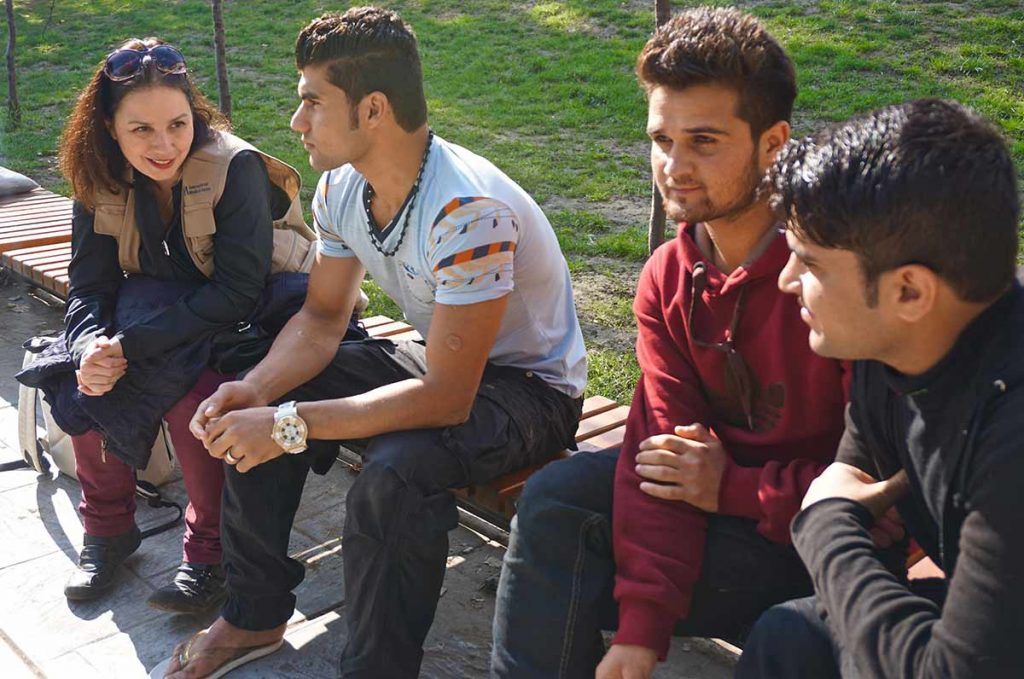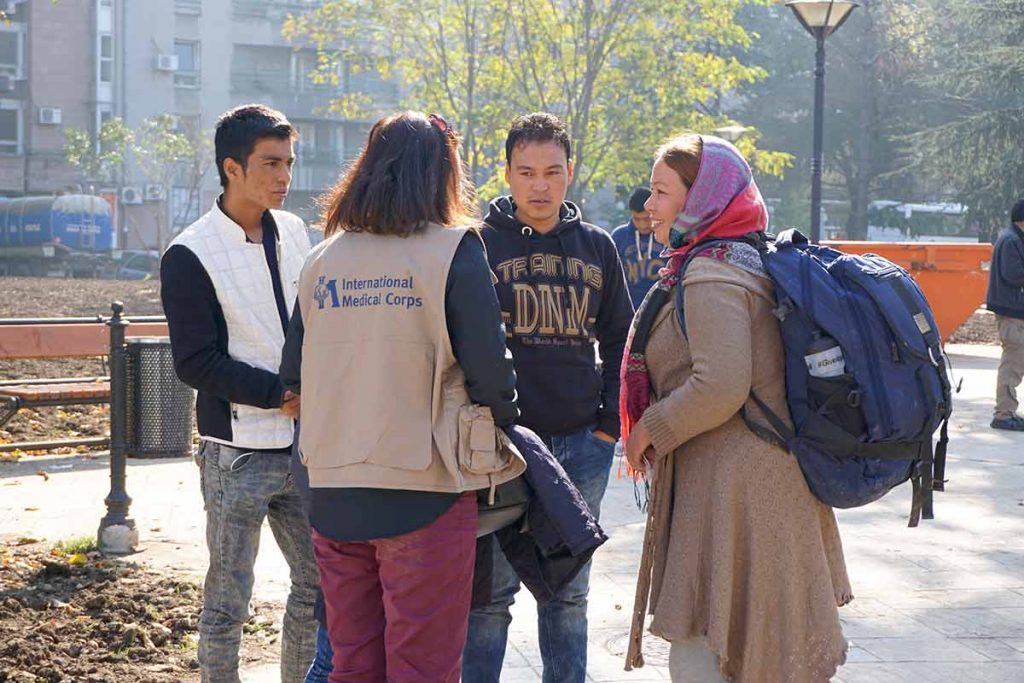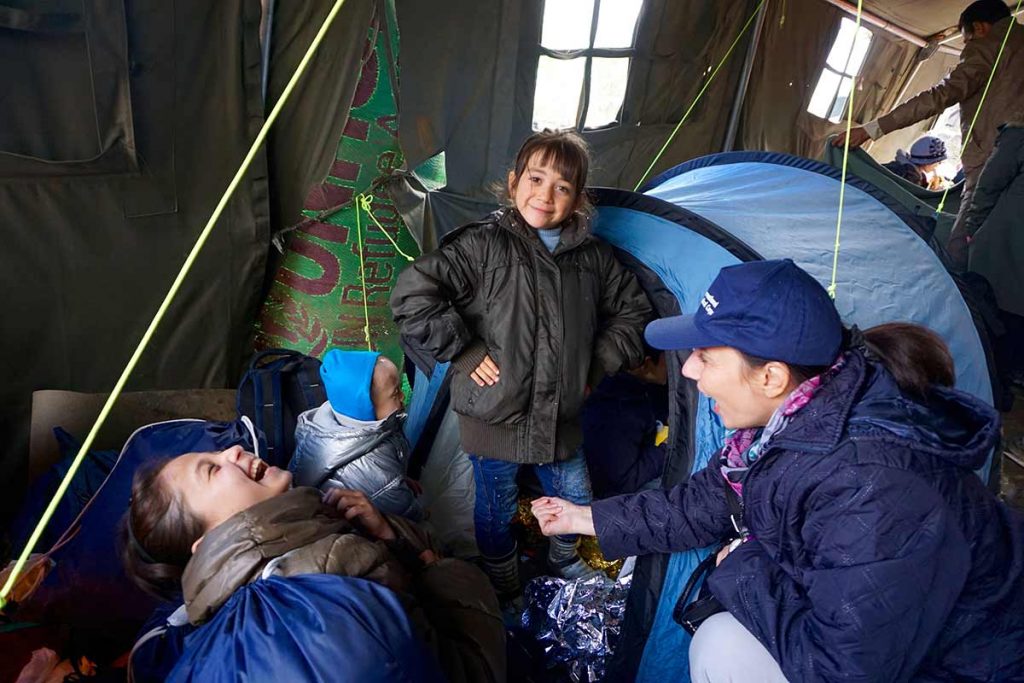Sanja Djurica, International Medical Corps’ emergency team leader in Serbia, walks through a small park in the center of Belgrade which has been a gathering point for refugees passing through this country since the start of the refugee exodus to Europe earlier this year.
A month ago, the park was overflowing with refugees—hundreds of new arrivals daily. A mobile medical unit, operated by International Medical Corps and its local partner, was spending much of its time here delivering medical and psychological first aid to weary travelers. But the number of refugees transiting through Belgrade has slowed significantly. Most refugees are rushing through the country by foot, bus or train, anxious to continue their journey northward. The mobile medical unit concentrates its efforts in the border region now, tending to the needs of refugees at various reception and transit centers as they wait to cross into Croatia. But Sanja has returned to the park on this day to take stock of refugee numbers and assess ongoing needs there.
It is the first sunny day in over a week and the park is tranquil. About 50 refugees are sitting quietly on benches, basking in the sun’s soothing warmth. Sanja approaches three young men and asks about their health, their journey to Serbia and their plans.

The youngest one, Wali* (16), is nervous at first. But he tells her that he and his two brothers (17 and 19) left the rest of their family behind in Jalalabad, Afghanistan many weeks ago and that the trip has been very difficult. Sanja tells him about her own travels through Afghanistan some years back—one of the many hot spots where she’s managed humanitarian aid programs. Wali and his brothers grin broadly, relax and their story pours out. They were taking a brief rest in Belgrade, Wali tells her, after a frightening trip through Bulgaria, trying to avoid “aggressive” police who detained and deported them back to Turkey during their first attempt to travel through the country. It was a similar experience in Iran, he explains, only the treatment by police was far worse. Wali tells her that he and his brothers hope to reach the border of Croatia the following day, and with luck, be in Germany by week’s end.
“In Germany, we can live without shooting and won’t be afraid anymore,” Wali says, although he remains afraid for his parents and five other siblings still in Afghanistan. He tells Sanja that he hopes some day they will be able to join him.
Sanja directs the brothers, and another Afghan family that had gathered nearby, to a nearby center in Belgrade where they can get food, warmer clothes and transportation information for the next phase of their trip.

“The situation is very fluid in Serbia,” explains Sanja, a pediatric nurse by training. “So we worked with our local partner, IAN, to establish a mobile medical unit with a doctor, nurses, a psychologist and a translator that adapts to changing needs. Every day we coordinate with local health authorities in the border region and determine where the medical unit is needed most.”
Sanja says the nights in Serbia have become bitter cold and the medical unit is treating more and more refugees for flu, cold and upper respiratory conditions. “The man power here is not enough, and the needs are huge,” she says. “As the weather worsens, we know the health of refugees will deteriorate too,”
Sanja is Serbian and clearly remembers the war in her country and region and the refugees it produced, including her own relatives:
“I remember crying for the refugees who were walking and walking, but feeling so powerless to change the situation, until I had a chance to help,” she recalls.
Sanja started working in Montenegro in 2000 for an organization that was helping Croatian and Bosnian refugee returnees, and soon after, displaced people from Kosovo. Since then, she has skirted the globe, assisting people in Uganda, Liberia, Afghanistan, South Sudan and most recently, Yemen with International Medical Corps.
“What you learn is that it doesn’t matter where you’re from, all displaced people suffer the pain of leaving what they love behind and even use the same phrases to describe what they’ve lost, what they need, what they hope for,” she says. “Whether you’re a Sudanese refugee fleeing to Uganda or a Syrian refugee fleeing through Serbia, you end up with a small bag in your hand and all you have from home is your memories.”
Sanja says she was proud of Serbia’s response when refugees from far off lands started arriving in need of help.
“Regular people in large numbers started coming to the park and the roads with tea in thermoses and packages of food and clothing. No one asked them to do it, they just did it, because they couldn’t stand still and watch women and children sleeping on the cold and wet ground. So many people here are still traumatized by the war. They know the ordeal that these Syrians, Afghans and other refugees are going through.”
